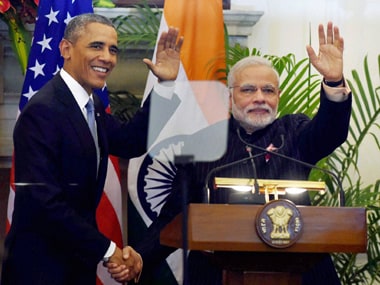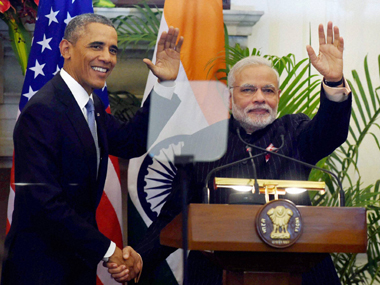Indian Prime Minister Narendra Modi and US President Barack Obama on Sunday ended the six-year-old deadlock over operationalising the landmark civil nuclear deal signed in 2008. “The civil nuclear agreement was the centrepiece of our transformed relationship. It demonstrated new trust. It also created new economic opportunities and expanded our option for clean energy. In the course of the past four months, we have worked with a sense of purpose to take it forward,” the PM Modi said in a joint address at Hyderabad House. India and the United States had signed the civilian nuclear deal in 2008, during the UPA government’s first term, but differences remained over an Indian nuclear liability law that makes equipment suppliers ultimately responsible for an accident. Countries like France and the US had been asking India to follow global norms under which the primary liability lies with the operator. [caption id=“attachment_2063547” align=“alignleft” width=“380” class=" “]  PM Narendra Modi and US President Barack Obama conclude the joint press interaction at Hyderabad House on Sunday. PTI[/caption] “I am pleased that six years after we signed our bilateral agreement, we are moving towards commercial cooperation, consistent with our law, our international legal obligations, and technical and commercial viability,” said Modi. In his address during the joint press conference Obama said, “Today we achieved a breakthrough understanding on two issues that were holding up our ability to advance our civil nuclear cooperation and we are committed to moving towards full implementation.” Added Obama, “This is an important step that shows how we can work together to elevate our relationship.” During his visit to the US in September 2014, Modi and Obama had decided to set up a high-level Contact Group on civil nuclear cooperation. Earlier, the US had demanded that it be allowed to track nuclear material supplied to India. According to a highly placed source, “The US has agreed to withdraw the tracking clause in India-US Nuclear Deal.” “We have decided to give this critical partnership a new thrust and sustained attention. For this, we have agreed that India and the United States must have regular summits at greater frequency. And, we will also establish hotlines between myself and Barack and our National Security Advisors,” added Modi. The issue of nuclear liability had been a bone of contention on reaching an agreement. As per the international norms, in case of any accident, the Indian government would have to pay heavy damages because all the nuclear plants in the country are run by the state-owned Nuclear Power Corporation of India (NPCIL). India had ruled out changes in its 2010 liability legislation but offered to set up an insurance pool to indemnify companies that build reactors in the country against liability in case of a nuclear accident. “The deadlock over the nuclear deal has been done away with during a one-on-one talk between PM Modi and President Obama,” the source added. As per a new plan, those companies engaged in building nuclear reactors in India would buy insurance from the state-run reinsurer GIC Re. The companies would then recoup the cost by charging more for their services. Alternatively, the NPCIL would take out insurance on behalf of these companies. The 2008 deal exempted India from an international sanctions regime that disallowed India from importing fuel or civilian nuclear technology unless it gave up its nuclear weapons. The US persuaded the international community to end this policy. Though never officially promised, Washington expected India would buy three or four US reactors as a partial reward. The primary opposition to the nuclear deal in India, however, came from the Communist Party of India (Marxist) and its parliamentary allies. They had alleged that the deal would undermine the sovereignty of India and compromise foreign policy and also claimed that the Indian government was hiding certain clauses of the deal, which would harm India’s indigenous nuclear program. “Lot of speculation was made ahead of this meet that the Nuclear Deal would get cancelled, and the same was reported by a section of the media. Such high-level decisions can’t be made public till they actually take place. It’s a landmark move in India-US relation,” a senior official in the Ministry of External Affairs told Firstpost.
Indian PM Narendra Modi and US President Barack Obama ended the six-year-old deadlock over operationalising the landmark civil nuclear deal signed in 2008.
Advertisement
End of Article


)

)
)
)
)
)
)
)
)



